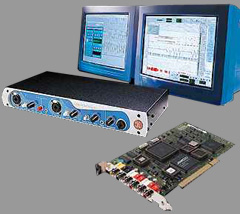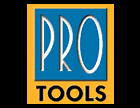MAIN FEATURES |
 |
 |
Intuitive
software interface.
Based on two main windows, Pro Tools sofware basics are really
simple to understand:
- the EDIT window provides full support to track parameter view
and editing operation;
- the
MIX window offers a graphic mixing console freely configurable.
 Software
overview Software
overview
 Pro
Tools 5 Peripherals Pro
Tools 5 Peripherals
MIDI advanced edit support.
Pro Tools 5 support for the first time MIDI advanced editing. MIDI
tracks are shown under piano-roll view and a lot of MIDI operations
are available. The Audio/MIDI sync is extremely accurate (single
sample reference).
Fast access to Audio and MIDI data.
Because Pro Tools is based on hard disk recording, it allows to
immediately locate any point of the song, optimizing times when
realizing production or post production projects.
Since Pro Tools 5 supports now also MIDI editing, MIDI and Audio
parts can be located at the same time for any modification.
Non destructive operating logic.
Compared with tape systems, a big difference is that each recorded
or edited file is stored in memory still unchanged, being always
available to the operator.
This allows the operator to remain focused on the recording creative
details without any fear in case of editing mistakes or accidental
track erasure.
Full dynamic automation.
The software includes full parameter automation support.
Automation can be programmed from the EDIT (graphic off-line) or
the MIX window (real time).
Depending from the Pro Tools system used, the mixer can provide
up to 72 input/output channels with remote control facilities thru
a dedicated control surface (Digidesign ProControl or Mackie HUI).
Being dynamic the allocation of the system resources, it is possible
to program various console types, each one equipped with various
routing and processing options that can be immediately recalled
at any time.
|
 |
System
flexibility (CPU-based and TDM-based systems).
Pro Tools software and hardware support both CPU-based and TDM-based
technology:
- Pro Tools 5, with DIGI TOOLBOX XP (based on AudioMedia III) or
DIGI 001 systems, offers basic or large audio I/O, also including
MIDI I/O support (DIGI 001 only).
Up to 24 Audio track (16 or 24-bit) and 128 MIDI tracks can be managed,
while the mixing system provides up to 5 insert and 5 aux send per
channel, in addition to a flexible 16-bus routing facility.
These systems offer a really good Q/P ratio, but their performance
depends from the CPU power of the host computer.
- Pro Tools 5, with 24 or 24-Mix/MixPlus systems, offers freely
configurable I/O and real time TDM processing power, independently
from the CPU-power of the host computer.
Up to 72 I/O channels can be managed with 64 Audio tracks (24-bit)
and 128 MIDI tracks, while the mixing system provides up to 5 insert
and 5 aux send per channel in addition to an enhanced 32-bus routing
facility.
These systems are really powerful and flexible, but globally much
more expensive because of the sophisticated hardware and the additional
I/O interfaces required.
RTAS and TDM Plug-in signal processing.
The signal processing features of the system are related to the
real time system calculation power and to the available plug-in.
Pro Tools 5 support RTAS and TDM plug-in for real-time processing:
- RTAS (Real Time AudioSuite) plug-ins use the CPU processing power
and are able to work with any hardware.
- TDM plug-ins work only with TDM-based hardware. Due to the built-in
DSP processing ability of the TDM hardware several plug-in can be
used at the same time independently from the CPU power of the used
host computer.
In additions to RTAS and TDM technology, the basic AudioSuite type
plug-ins are also available for "off-line" processing (not in real
time). This option is always useful for non-TDM systems when used
with host computer equipped with low-powerd CPU.
For example a Power Macintosh 8500 (based on 604/120MHz CPU) can
support up to 3/4 RTAS plug-ins.
If additional processing is required, AudioSuite plug-ins can be
proficiently used.
QuickTime support.
Pro Tools can manage QuickTime movies for AV applications.
The most important available operations are the following:
1. To import a QuickTime movie into a session.
2. To import audio from QuickTime movies.
3. To syncronize audio events to QuickTime movie (using Pro Tools
audio editing features)
4. To scrub audio tracks in sync with QuickTime movies
5. To compile a new "flattened" QuickTime movie that can be read
by any QuickTime reader.
MP3 and RealAudio G2 format support.
Pro Tools 5 can export data using MP3 (optional) and RealAudio G2
protocols. About MP3 a full demo version (30 days) is provided.
|
| |
|
|
 |



